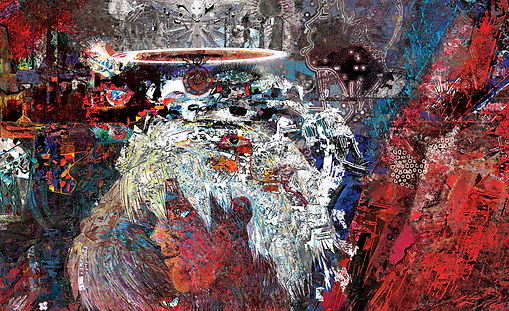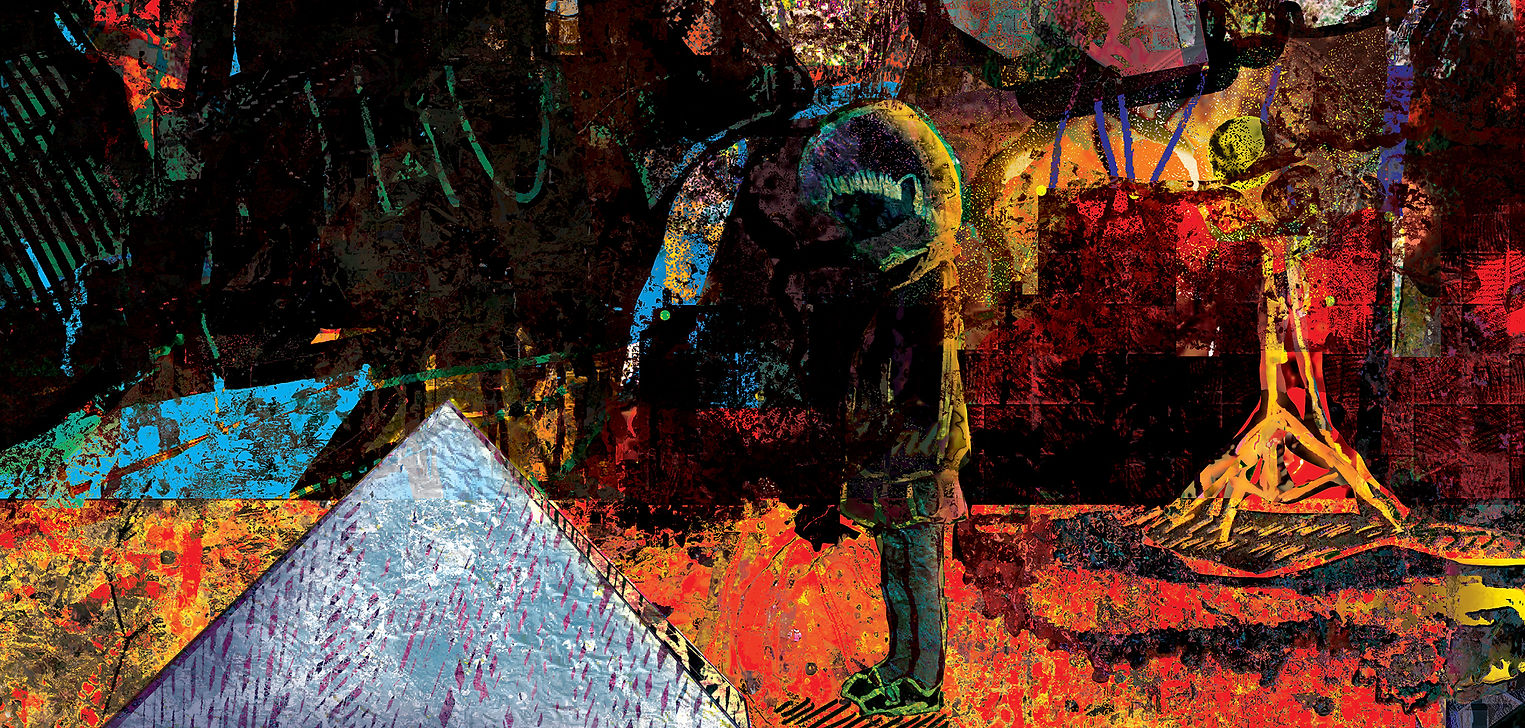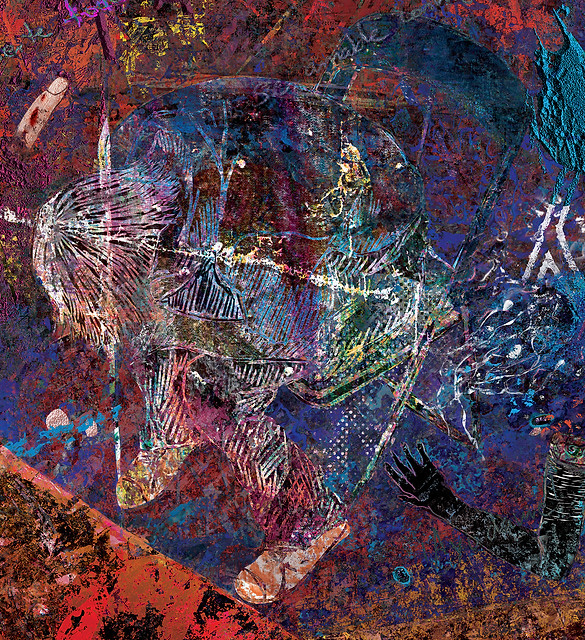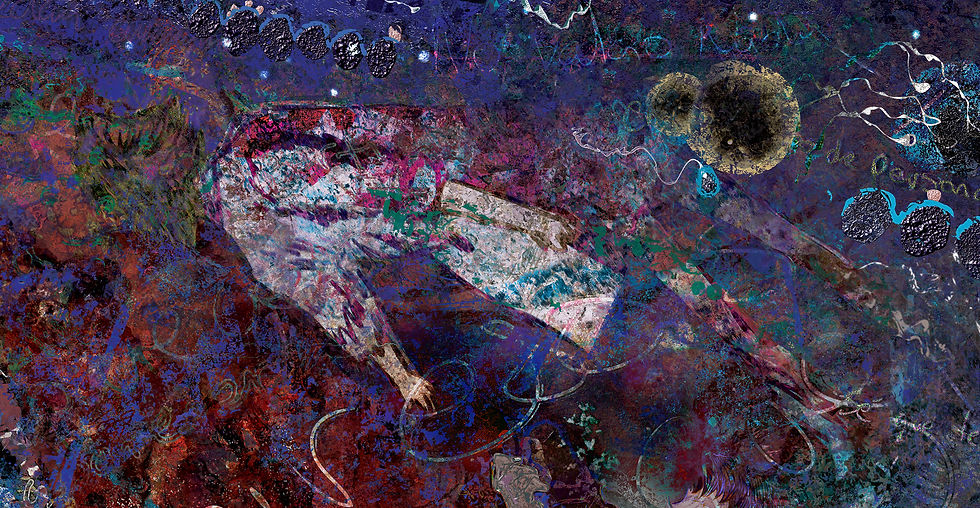








EVA
Quadriptych, 118.11" x 157.48"
Hahnemühle Photo Rag Bright White Mounted on Aluminum
2022
This large-scale piece is a tribute to the series "Neon Genesis Evangelion," capturing a broad spectrum of its narrative; it aims to evoke the most significant and thrilling moments of the series in relation to my own experiences over the decade it took to complete this work. It is not just a homage to Hideaki Anno's anime, but also a visual testimony of its impact on my journey from adolescence to adulthood.


DECONSTRUCTING THE ARTWORK
THE ANGELS










In the universe of "Neon Genesis Evangelion," the Angels transcend their role as mere opponents, becoming manifestations of a profound enigma. As we delve deeper into the plot, we realize that these beings are not just obstacles but representations of universal dilemmas that we all face.
Despite their celestial name, the Angels always maintain an aura of mystery and enigma. Their very existence raises questions: Who really are they? What is their purpose? As the EVA pilots, the protagonists of the series, confront these seemingly invincible enemies, we cannot help but feel a connection to their internal struggles, as the Angels serve as vehicles to explore their experiences and emotions.
Thus, the battle against the Angels can be seen as a metaphor for our own struggle to connect and be understood by others.
THE CHARACTERS
Within the story, the main characters are woven with traumas and dilemmas.




The main characters of the series are Shinji Ikari, Asuka Langley Soryu, and Rei Ayanami, three 14-year-old teenagers.
Shinji Ikari struggles with abandonment by his father following his mother's death. This feeling intensifies when his father recruits him as the pilot of a giant robot to combat entities known as Angels. Shinji feels insecure and confused about his role and the acceptance of responsibilities imposed by a distant and critical father. Throughout the series, Shinji uncovers shocking secrets about his mother's death and his connection with Rei Ayanami, another pilot.
Asuka Langley Soryu, on her part, deals with the trauma of her mother's suicide, which leads her to adopt a facade of strength and hide her vulnerabilities. Asuka constantly struggles with the need to prove her worth and superiority, while internally managing feelings of inadequacy and rejection.
Rei Ayanami, the first pilot to be recruited, is initially characterized by her submission and apparent indifference towards her own life. However, it is revealed that her behavior is part of a meticulously orchestrated plan by Shinji's father, who has specific intentions for her that are crucial for the plot development.












INSTRUMENTALITY
In the series "Neon Genesis Evangelion," the "Human Instrumentality Project" forms a central axis enriched with multiple layers of meaning. This plan, devised by the secret organization SEELE and Gendo Ikari, aims to implement "Human Complementation." This process involves the fusion of all human souls into a single entity, pursuing a state of existence that is superior, free from suffering and loneliness, but at the cost of individuality and personal autonomy. This premise raises profound questions about free will and the true meaning of human existence.
In a broader sense, the Human Instrumentality Project can be seen as a reflection of human efforts to evade pain and loneliness through means such as technology and adherence to social norms. The series invites reflection on whether this type of "complementation" might lead to the loss of the singularity and autonomy that define humanity.
Moreover, the project highlights the duality of the human condition: in seeking to eliminate suffering, there is also the risk of losing the ability to experience joy and personal growth that arises from facing challenges. This aspect shows that life is characterized by its contrasts and that it is through them that we find meaning and personal development.
As the plot progresses, the protagonist, Shinji Ikari, faces a decisive choice.

















HUMAN INSTRUMENTALITY AND COMPLEMENTATION
In the series "Neon Genesis Evangelion," the concepts of "Human Instrumentality" and "Complementation" refer to the merging of all human souls into a single entity. This process, which can be viewed as both spiritual and physical fertilization, symbolizes the convergence of multiplicity into a singular entity.
Sexuality is a deeply explored theme in the series and serves as a metaphor for this union. The act of merging souls is symbolically represented, drawing parallels to the biological process in which sperm and eggs merge to create new life. This analogy emphasizes the themes of creation and transformation within the series.






CULMINATION
The resurrection of Lilith represents the climax of the series, marking a crucial point in the narrative that integrates religious, philosophical, and psychological elements. Lilith takes on the forms of Rei Ayanami and Kaworu Nagisa, key characters in Shinji Ikari's life. With their help and that of Evangelion Unit 01, Shinji finds himself at the center of critical events triggered by the onset of Human Instrumentality, a process that will determine the fate of humanity.

























ADDITIONAL DETAILS OF THE ARTWORK











